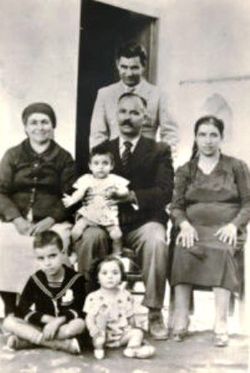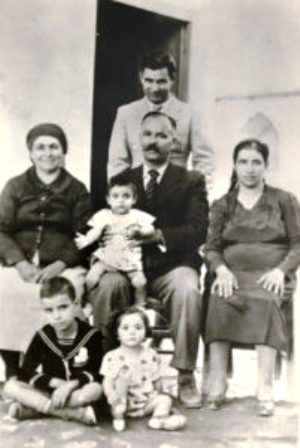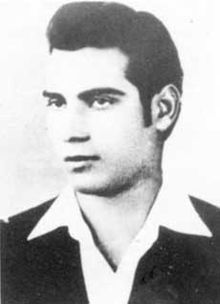Pallikarides was born in Tsada, Paphos District, one of five children of Miltiades and Aphrodite Pallikarides. He studied at the Greek High School of Paphos where, at age 15, he participated in his school's boycott of the coronation of Queen Elizabeth II in June 1953.
Due to celebrations in honor of Queen Elizabeth II's coronation, the British raised the Union Jack at all schools throughout Cyprus. Paphos was the only town where celebrations were not held because Pallikarides had deliberately taken down the British flag from the Paphos Gymnasium Gym propylaea (entrance) and knew full well what the consequences of such an act would be. He carried on his resistance with other secondary school pupils by forcibly bending during the night all British flag bearing iron posts along the main street entrance to Paphos as well as with demonstrations.
When EOKA began the struggle against British colonialism in 1955, Pallikarides took part in several anti-British demonstrations and joined EOKA when he was just 17 years old. In November 1955 on his way to school he saw two British soldiers mercilessly beating a friend who had been arrested and tied to an electricity pole because he refused to say who lowered the British flag during the previous night in the grounds of the Paphos Hospital. Pallikarides assaulted, struck the two British soldiers and freeing his friend escaped the scene. He was arrested himself later on the same day and sent for trial at the Paphos District Court on alleged charges of rioting. Pallikarides denied the charges and was ordered to reappear for trial on December 6, 1956. Anticipating imprisonment in the special concentration camps set up by the British for mere suspects, he decided to take to the mountains, where he joined one of the many EOKA guerrilla groups that operated throughout Cyprus.
Over the next year, Pallikarides participated in several guerrilla operations. Meanwhile, a reward of 5,000 pounds was put on his head by the British Army.
Pallikarides was arrested on December 18, 1956 because he was caught red-handed with his guns loaded on a donkey. The police had privately reported that he had murdered a man, considered to be a British collaborator by EOKA, although there was no evidence for this claim of murder.
At his trial Pallikarides did not deny possession of the weapon. He said he did what he had to do as a Greek Cypriot seeking his freedom. He was sentenced to death by hanging for firearms possession on February 27, 1957. Pallikarides was hanged on March 14, 1957, at the age of 19. A propaganda leaflet was published after the hanging with a fabricated description of how he had murdered a traitor. The lawfulness of his execution has been subsequently questioned in light of the fact that the weapon held by Pallikarides at the time was not functional. A. W. B. Simpson in his book Human Rights and the End of Empire, claims that the real reason for his execution was that the authorities believed, but were unable to prove,[1] that he had earlier murdered an elderly individual who was a suspected collaborator with the British authorities.
Pallikarides was born in Tsada, Paphos District, one of five children of Miltiades and Aphrodite Pallikarides. He studied at the Greek High School of Paphos where, at age 15, he participated in his school's boycott of the coronation of Queen Elizabeth II in June 1953.
Due to celebrations in honor of Queen Elizabeth II's coronation, the British raised the Union Jack at all schools throughout Cyprus. Paphos was the only town where celebrations were not held because Pallikarides had deliberately taken down the British flag from the Paphos Gymnasium Gym propylaea (entrance) and knew full well what the consequences of such an act would be. He carried on his resistance with other secondary school pupils by forcibly bending during the night all British flag bearing iron posts along the main street entrance to Paphos as well as with demonstrations.
When EOKA began the struggle against British colonialism in 1955, Pallikarides took part in several anti-British demonstrations and joined EOKA when he was just 17 years old. In November 1955 on his way to school he saw two British soldiers mercilessly beating a friend who had been arrested and tied to an electricity pole because he refused to say who lowered the British flag during the previous night in the grounds of the Paphos Hospital. Pallikarides assaulted, struck the two British soldiers and freeing his friend escaped the scene. He was arrested himself later on the same day and sent for trial at the Paphos District Court on alleged charges of rioting. Pallikarides denied the charges and was ordered to reappear for trial on December 6, 1956. Anticipating imprisonment in the special concentration camps set up by the British for mere suspects, he decided to take to the mountains, where he joined one of the many EOKA guerrilla groups that operated throughout Cyprus.
Over the next year, Pallikarides participated in several guerrilla operations. Meanwhile, a reward of 5,000 pounds was put on his head by the British Army.
Pallikarides was arrested on December 18, 1956 because he was caught red-handed with his guns loaded on a donkey. The police had privately reported that he had murdered a man, considered to be a British collaborator by EOKA, although there was no evidence for this claim of murder.
At his trial Pallikarides did not deny possession of the weapon. He said he did what he had to do as a Greek Cypriot seeking his freedom. He was sentenced to death by hanging for firearms possession on February 27, 1957. Pallikarides was hanged on March 14, 1957, at the age of 19. A propaganda leaflet was published after the hanging with a fabricated description of how he had murdered a traitor. The lawfulness of his execution has been subsequently questioned in light of the fact that the weapon held by Pallikarides at the time was not functional. A. W. B. Simpson in his book Human Rights and the End of Empire, claims that the real reason for his execution was that the authorities believed, but were unable to prove,[1] that he had earlier murdered an elderly individual who was a suspected collaborator with the British authorities.
Sponsored by Ancestry
Advertisement
Advertisement



